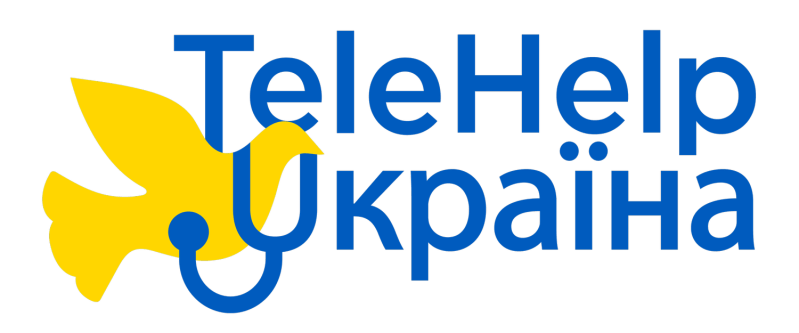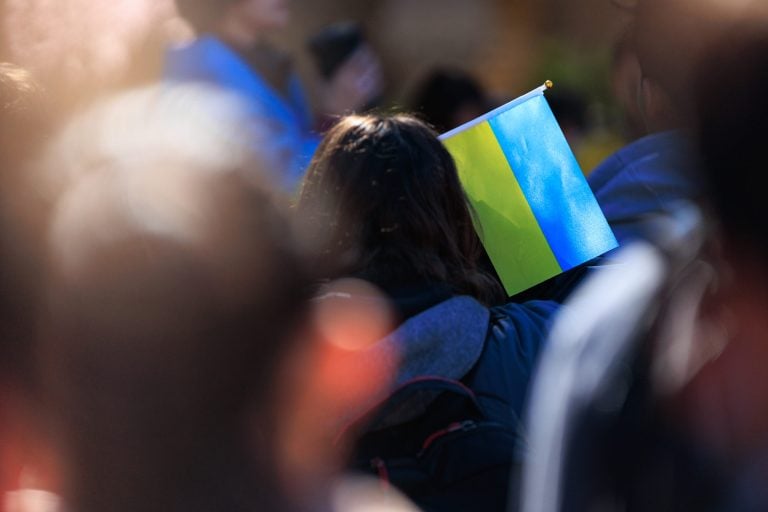As Russia began its military invasion of Ukraine in late February, Sol Savchuk M.D. ’24 and Zoe von Gerlach M.S. ’23 were looking for a window into the front lines. They, like so many other Ukrainian students at Stanford, were desperate for a way to help the resistance effort.
“For two days, we were glued to our phones,” Savchuk said. “We were recovering from the shock that this happened in the 21st century, even if we shouldn’t have.”
But rather than thinking of heavy artillery or emergency supplies, the pair were visualizing another form of support — healthcare. Only three days after the initial invasion, the idea for TeleHelp Ukraine had been born.

Gerlach and Savchuk were intrigued by the idea of combining telecommunication with medical care. Virtual clinical services became more common during the COVID-19 pandemic when medical students around the world were taught to communicate and serve patients through video platforms.
“We initially thought about just putting up the Zoom link, and then we realized how much more complicated it actually is,” Gerlach said.
TeleHelp’s founders took into consideration many factors, including the physician recruitment process, the type of technology platform needed and what implications the platform had for ease of navigation, even with varying levels of internet connection.
For Savchuk and Gerlach, being able to assign specialists to help their patients while also using their preferred language — Ukrainian or Russian — was essential.
They noticed other telehealth platforms ran into an issue with solely English-speaking clinicians who signed up to help but weren’t able to efficiently volunteer because of the language barrier with patients. TeleHelp Ukraine uses interpreters, which allows them to utilize international practitioners while avoiding linguistic roadblocks.
Language barriers “motivated us to provide this specific platform and is what makes TeleHelp Ukraine different and unique from other telehealth solutions,” Gerlach said.
Navigating tough beginnings
Like many new nonprofits, the TeleHelp Ukraine team had initial difficulties reaching patients in need. “Starting an organization like this … from scratch, especially as people who aren’t serious entrepreneurs, definitely came with a lot of challenges,” Gerlach said.
It took the organization several months to build its platform. They worked to create a strong social media presence during their first few months to reach Ukrainians.
“Just because you have a product doesn’t mean people know where to find it,” said Eva Morgun, who is the director of operations at Telehelp.
At only three months old, TeleHelp Ukraine reaches thousands of people a day through platforms like Instagram and Facebook. The organization also employed local news stations, newspapers and word-of-mouth marketing strategies to reach more people.
TeleHelp Ukraine has grown tremendously due to its strong media presence, dedicated team of directors and volunteers and “overarching mission” to help those in need, Savchuk said. Currently, it has over 80 volunteers, 20 interpreters, 100 clinicians and several faculty advisors.
Operations
Patients can book an appointment through the TeleHelp website, where they choose between categories of available services, ranging from mental health to pediatric care. After filling out some basic information regarding the type of care they need and the language they prefer, they are paired up with physicians and interpreters based on availability.
Health navigators assist patients in participating in their scheduled appointment in case complications arise. Appointments are three-way calls between the interpreter, physician and patient, which can increase the likelihood of logistical issues. Health navigators provide patients with reliable resources.
“The Health Navigator [role] is very important because we have a lot of patients in Ukraine who don’t necessarily have the most advanced cell phones, and they probably don’t have updated browsers,” Morgun said.
Prioritizing mental health
Mental health is one of the top priorities for the entire TeleHelp team due to the lack of awareness in traditional Ukrainian society, Morgun and Solchuk said. They have specifically sought out mental health specialists and it is one of the fields that has flourished since the organization’s founding.
“Mental health [awareness] in Ukraine has not been the strongest to begin with,” Savchuck said. “When patients started to exhibit signs of mental health problems, Ukraine [policy] wasn’t necessarily prepared to address them.”
Many residents faced constant trauma such as the fear of loss, separation from families, social isolation and forced migration due to Russia’s invasion of Ukraine. Traumatic experiences have many long-term effects on their emotional and physical health, causing problems such as post-traumatic stress disorder, depression and anxiety, according to Médecins Sans Frontières (Doctors Without Borders).
“People are now aware that they need help,” Savchuk said. “Not only patients and refugees, but also volunteers and providers that help these refugees. That’s where [TeleHelp Ukraine] could come in and satisfy their needs.”
TeleHelp has served more than 100 patients, with more appointments and virtual meetings every week. With many patients signing up, the team hopes to widen its range of services, to help as many people as possible.
“Everyone on the team has put in countless hours, days, weeks and months into making this happen,” Gerlach said. ”We can hopefully even continue expanding the services offered, and seeing more and more patients.”
A previous version of this article stated that Zoe von Gerlach was Ukrainian. The Daily regrets this error.
This article has also been updated to reflect increases to the number of volunteers and providers working with TeleHelp.
